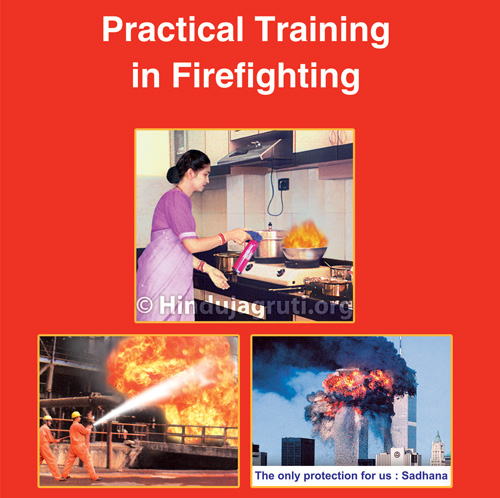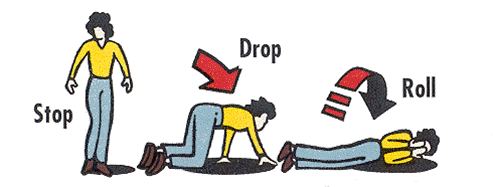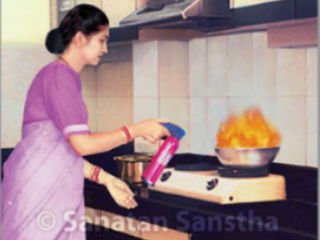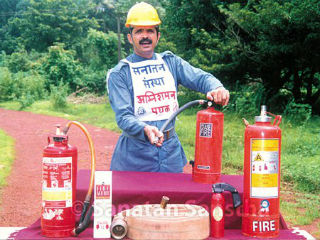In our last Issue, we learnt about Components of fire, Common causes of fire, Classification of fires, What will you do when you see fire ?, Some techniques of firefighting, Agents used in firefighting, Situations and remedial measures. Now, read ahead.

H1. Escaping from a burning house or a premises
The last person to leave a room or storey that is on fire should just shut the door, not lock it, else it will hamper search and rescue operations of the team of firefighters.
- Use only the escape route mentioned in the emergency action plan.
- Never take an elevator in emergency situations.
- Bend to avoid smoke & poisonous gases. Pure air remains at the ground level. If necessary, drop to the ground and crawl forward on your hands and feet. Do not crawl on the stomach. Smoke rises upwards due to the heat, and some heavy poisonous gases form a layer over the floor. Hence, when crawling, keep your head approximately half-a-meter above the ground.
- If possible, cover your nose and mouth with a wet cloth.
- Walk along the walls when descending a burning staircase / room. Since the walls are erected over the main RCC structure of the building, the section near the walls is the safest. The other sections are likely to collapse.
- In a multi-storey building, the staircase is the only main path of escape. Evacuate the building without feeling frightened, cautiously and in a disciplined manner.
- Keep to one side while descending the staircase. Leave the other side free for the firefighting and rescue teams. Never climb a staircase during a fire.
- Inform the team of firefighters and the Police about the fire immediately after leaving the building.
H2. If your clothes catch fire

Stop – Wherever you are
Fall – To the ground
Roll – On the floor
This will smother the flames and extinguish them, and you can be rescued. If your clothes catch fire, do not run out of panic, since running fans the flames.
H3.If your companions catch fire
- Wrap the burning individual in a rug, blanket, mat or any thick cloth.
- Take off the burnt clothes when the fire gets extinguished.
- Provide the required first-aid.
Sanatan’s text also elaborates on the remedial measures in case of leakage of cooking gas, in case of a stove or oil in a pan catching fire, leakage of cooking LPG gas.
I. Measures for prevention of fire
Given ahead are some preventive measures that can be taken in some spheres of your daily life.
I1. Fires arising from electricity and electrical appliances
- Switch off and unplug the electrical appliance after use.
- If electrical appliances are opened for repairs, ensure that the wires are joined securely. Get the job done only from a skilled technician.
- Keep electrical appliances clean, especially their motors. Do not allow dust, oil or grease to accumulate on them.
- Electrical hand lamps used in factories have long wires for easy mobility. The hand lamps should have a glass casing to prevent oily substances in its vicinity from catching fire.
- Do not keep / store combustible substances near electrical appliances / switches.
- Replace a blown off fuse wire with one of the right capacity.
- If any electrical appliance emits a burning or unnatural odour, switch it off and get it tested from a skilled technician. Burning odour is the first sign of an electrical appliance catching fire.
- Never overload any electrical appliance or electrical point beyond its capacity.
- Never install electrical wires in water or in hot areas. Never fix them to the ground, under the carpet or through doors / windows.
- Do not touch electrical appliances with wet hands.
- Never leave joints of electrical wires exposed; cover them with insulation tape.
I2. Fires in the kitchen
- Design and set the kitchen appropriately from the safety perspective.
- Do not wear loose, flowing clothes while cooking. Tuck the loose end of the sari securely in the petticoat.
- Always use a pair of pincers or a holder to remove hot vessels from the stove. It is very dangerous to use a towel, cloth or loose end of a sari for this purpose.
- Do not leave the house with the gas stove, stove or oven on.
- Extinguish candles and oil lamps when no one is at home or when going to bed.
- Always place a gas stove or stove used daily at a height. Never place it on the floor.
- When placing a utensil with a handle on the stove, ensure that the handle faces inwards.
- Keep wooden cupboards, planks, curtains and other combustible items away from the stove.
- Never allow children to play in the kitchen.
- Use a microwave oven cautiously. Though externally it may appear cool, the temperature of the food within may be high. If the food in the oven catches fire, switch off the current, and till the fire is extinguished, do not open the door of the oven.
- When lighting a matchstick, keep it away from the body. Before disposing it off, ensure that it is fully extinguished.
- Cleanliness is the foundation of preventing a fire.

 Techniques of firefighting
Techniques of firefighting Situations and remedial measures in firefighting
Situations and remedial measures in firefighting